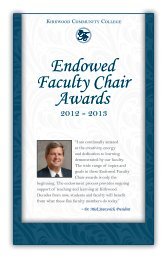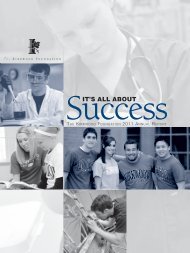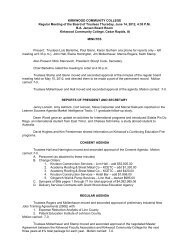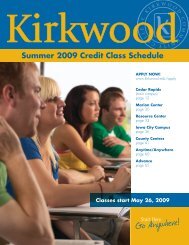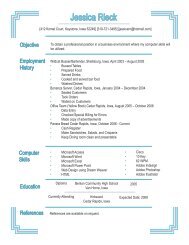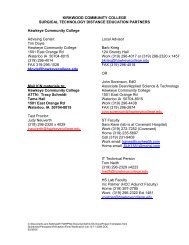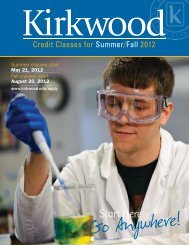Summer/Fall 2011 Credit Class Schedule - Kirkwood Community ...
Summer/Fall 2011 Credit Class Schedule - Kirkwood Community ...
Summer/Fall 2011 Credit Class Schedule - Kirkwood Community ...
Create successful ePaper yourself
Turn your PDF publications into a flip-book with our unique Google optimized e-Paper software.
COURSE DESCRIPTIONS . summer & <strong>Fall</strong> <strong>2011</strong> . <strong>Kirkwood</strong> <strong>Credit</strong> <strong>Class</strong> <strong>Schedule</strong><br />
Web Analytics 3<br />
> BCA-300<br />
Introduces the key concepts, tools, techniques<br />
and practices of Web analytics, a core business<br />
and communication channel organizations use<br />
to realize their Web sites’ full potential. Focuses<br />
on how Web analytics can drive higher profits<br />
and improve customer experiences.<br />
Emphasizes techniques students can use to<br />
successfully advocate and promote the use of<br />
Web analytics by organizations.<br />
(3/0/0/0); ASE Code: B; Prereq: BCA-290, CIS-207,<br />
CIS-307<br />
BIO<br />
BIOLOGY<br />
Introductory Biology With Lab 3<br />
> BIO-104<br />
Intended as a beginning-level course for liberal<br />
arts students who are not planning to major in<br />
the sciences. The course includes genetics,<br />
evolution, ecology, plant and animal<br />
reproduction, and biodiversity. Current topics<br />
in life science are covered throughout the<br />
course. Students are offered a variety of<br />
opportunities in laboratory through<br />
investigations, discussion, written expression<br />
and readings.<br />
(2/2/0/0); ASE Code: A<br />
Basic Biological Concepts 3<br />
> BIO-110<br />
Designed for the student with little or no<br />
background in biology or chemistry, or as a<br />
refresher for the student who has not taken<br />
either for many years. Provides a basic<br />
foundation for further course work in the<br />
biological sciences.<br />
(3/0/0/0); ASE Code: B<br />
General Biology I 4<br />
> BIO-112<br />
Serves as an introductory course for biology,<br />
science and health science majors. Principles<br />
of cellular biology and elementary biochemistry<br />
and energy functions are covered; cell division,<br />
DNA/RNA and genetics follow. Evolution<br />
theory completes the work of the semester.<br />
(3/2/0/0); ASE Code: A; Prereq: BIO-110 or BIO-168<br />
or BIO-186<br />
Note: Besides taking a prerequisite course,<br />
proficiency may be demonstrated by a passing<br />
score on the Biology Readiness Exam. Contact<br />
the Test Center for details.<br />
76<br />
General Biology II 4<br />
> BIO-113<br />
Continues the study of General Biology I<br />
concentrating on organismal biology and<br />
ecology. The evolution and diversity of the<br />
Monera, Protista, Fungi, Plantae and Animalia<br />
are covered, followed by a comprehensive<br />
study of ecology. Additional topics include<br />
plant anatomy and physiology, and animal<br />
systems including, but not limited to, nervous,<br />
circulatory, reproductive and immune systems.<br />
(3/2/0/0); ASE Code: A; Prereq: BIO-112<br />
Nutrition 3<br />
> BIO-151<br />
Designed to show the relationship between<br />
sound nutrition and good health. Topics studied<br />
are: energy requirements, carbohydrates,<br />
lipids, proteins, vitamins, minerals,<br />
metabolism, physical exercise, dieting, weight<br />
problems, evaluation of nutritional claims,<br />
vegetarianism, and proper nutrition during<br />
pregnancy and lactation.<br />
(3/0/0/0); ASE Code: A<br />
Note: Does not count as a science course for the<br />
A.A. degree<br />
Human Biology 3<br />
> BIO-154<br />
Examines human form and function and the<br />
relationship of humans to other living things.<br />
Fundamental biological principles as they<br />
apply to the human are explored. This course is<br />
intended for liberal arts students who do not<br />
currently plan to major in the biological or<br />
health sciences.<br />
(3/0/0/0); ASE Code: A<br />
Basic Anatomy and Physiology 3<br />
> BIO-161<br />
Designed for students in the specific health<br />
sciences. An overview of human form and<br />
function presented in a lecture/laboratory<br />
format.<br />
(2/2/0/0); ASE Code: B<br />
Human Anatomy & Phys I w/Lab 4<br />
> BIO-168<br />
Introduces the structure and function of the<br />
human body. Organization at the cellular and<br />
tissue level and selected organ systems are<br />
emphasized. Laboratory activities (which<br />
include computer simulations, dissection, and/<br />
or human specimens) reinforce current<br />
concepts.<br />
(3/2/0/0); ASE Code: A; Prereq: One year of recent<br />
high school biology/chemistry with a grade of B<br />
or higher strongly recommended, or completion<br />
of Basic Biological Concepts or other collegelevel<br />
biology course<br />
Human Anatomy & Phys II w/Lab 4<br />
> BIO-173<br />
Continues the study of human organ systems.<br />
Laboratory activities and dissection, which<br />
includes computer simulations and human<br />
specimens, correspond to structures and<br />
functions investigated.<br />
(3/2/0/0); ASE Code: A; Prereq: BIO-168<br />
Human Anatomy 4<br />
> BIO-177<br />
Covers the gross structure and function of<br />
human body systems. Focuses on function as<br />
it relates to structure through class and<br />
laboratory activities. Laboratory experiences<br />
include cadaver study, human specimens,<br />
dissection and interactive group work.<br />
(3/2/0/0); ASE Code: A<br />
Note: Recommend BIO-110 or recent high school<br />
science class with a grade of B or above<br />
Human Physiology<br />
> BIO-180<br />
4<br />
Examines the physiological processes<br />
associated with human body systems. Topics<br />
include biochemistry, metabolism, hormone<br />
actions, muscular physiology,<br />
neurophysiology, cardiovascular function,<br />
renal function, acid/base/electrolyte regulation,<br />
nutrient absorption, immune response and<br />
reproduction functions. Lab investigates<br />
system physiological responses and<br />
culminates in a research experience.<br />
(3/2/0/0); ASE Code: A; Prereq: BIO-177<br />
Homeostatic Physiology<br />
> BIO-181<br />
3<br />
Designed for advanced Health Sciences<br />
students. This course emphasizes body<br />
systems important to maintaining homeostasis<br />
in the human. Nerve and muscle tissue,<br />
cardiac, respiratory, fluid-electrolyte and<br />
endocrine physiology are addressed.<br />
(3/0/0/0); ASE Code: B; Prereq: BIO-161<br />
Basic Microbiology 1.5<br />
> BIO-182<br />
Includes the structures and function of<br />
microorganisms, characteristics of pathogenic<br />
and nonpathogenic bacteria, infection<br />
processes, specifics of the immune response,<br />
and principles and applications of asepsis.<br />
(1/1/0/0); ASE Code: B<br />
<strong>Kirkwood</strong> <strong>Community</strong> College . <strong>Summer</strong> & <strong>Fall</strong> <strong>2011</strong> discover <strong>Kirkwood</strong> > www.kirkwood.edu



